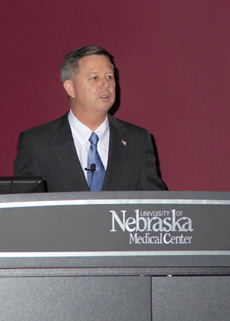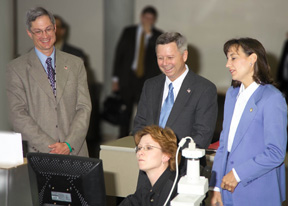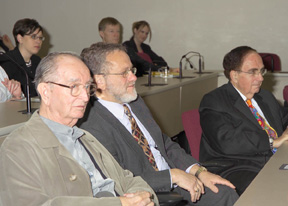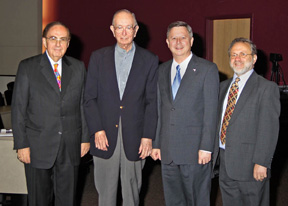Click here to watch the lecture.
|
UNMC Chancellor Harold M. Maurer, M.D., Harry McFadden Jr., M.D., Gov. Dave Heineman and Sam Cohen, M.D., Ph.D. Photos by Jim Birrell. |
“We lead the nation in putting everyone on one team,” Heineman said to a large crowd in the Durham Research Center Auditorium, where he joins the distinct list of McFadden lecturers, which includes three Nobel laureates. “We’re going to be the national champions when it comes to bioterrorism preparedness.”
Heineman praised UNMC’s role in advancing the Nebraska Model, “an integrated, coordinated and comprehensive” preparedness plan that spans everything from information technology and transportation to agriculture and academia.
UNMC has played a pivotal role in bioterrorism preparedness since 1997 when the public health lab moved to campus, Heineman said.
 |
Gov. Dave Heineman presents the 2005 McFadden lecture. |
“We knew from day one we needed to think outside the box and involve more people,” he said.
As a result, new alliances have been formed out of collaborations between government, academia and the private sector with the goal of being vigilant and prepared in the event of an emergency.
On Thursday, Heineman also touted the work of such UNMC programs as the Health Professions Tracking Center and the Center for Biopreparedness Education.
“UNMC is a Nebraska treasure,” Heineman said. “It’s an extraordinary institution that is doing incredible things for this state and for our nation.”
 |
Tony Sambol, left, Gov. Dave Heineman, and Ann Fruhling, Ph.D., University of Nebraska at Omaha’s Peter Kiewit Institute, view STATPack, an electronic consultation system which allows laboratories to exchange information and view diagnostic samples that are unusual or complex. Rhonda Noel, a medical technologist in UNMC’s Department of Pathology and Microbiology, sits at the computer. |
- A newly opened 10-bed biocontainment unit in The Nebraska Medical Center’s University Tower. One of only three in the nation, the biocontainment unit is a collaborative effort with the state Health and Human Services System. It is the largest unit in the country.
- The sharing of information technology infrastructure between the University of Nebraska and the Department of Administrative Services, to provide back-up capability in case of an emergency
- The integration of the private sector into the bioterrorism-preparedness network. For example, selected semi-trailer drivers now are trained to report suspicious activities on Nebraska highways.
- Nationally acclaimed education programs administered through the Center for Bioterrorism Education, a joint effort between UNMC, Creighton University and the state of Nebraska.
- The coordination of all bioterrorism preparedness-related projects between key partners such as the Nebraska Emergency Management Agency, the Nebraska State Patrol and the National Guard, so all participants know priorities.
Despite the state’s progress and the recognition it has received nationally, the work continues, Heineman said. “We can’t stand still. Everyday we have to improve the system.but, as governor, I am enormously proud of what our state has accomplished and extraordinarily proud of what this medial center has done. Without you we wouldn’t be national leaders.”
 |
Harry McFadden Jr., M.D., Sam Cohen, M.D., Ph.D., and Harold M. Maurer, M.D. |
